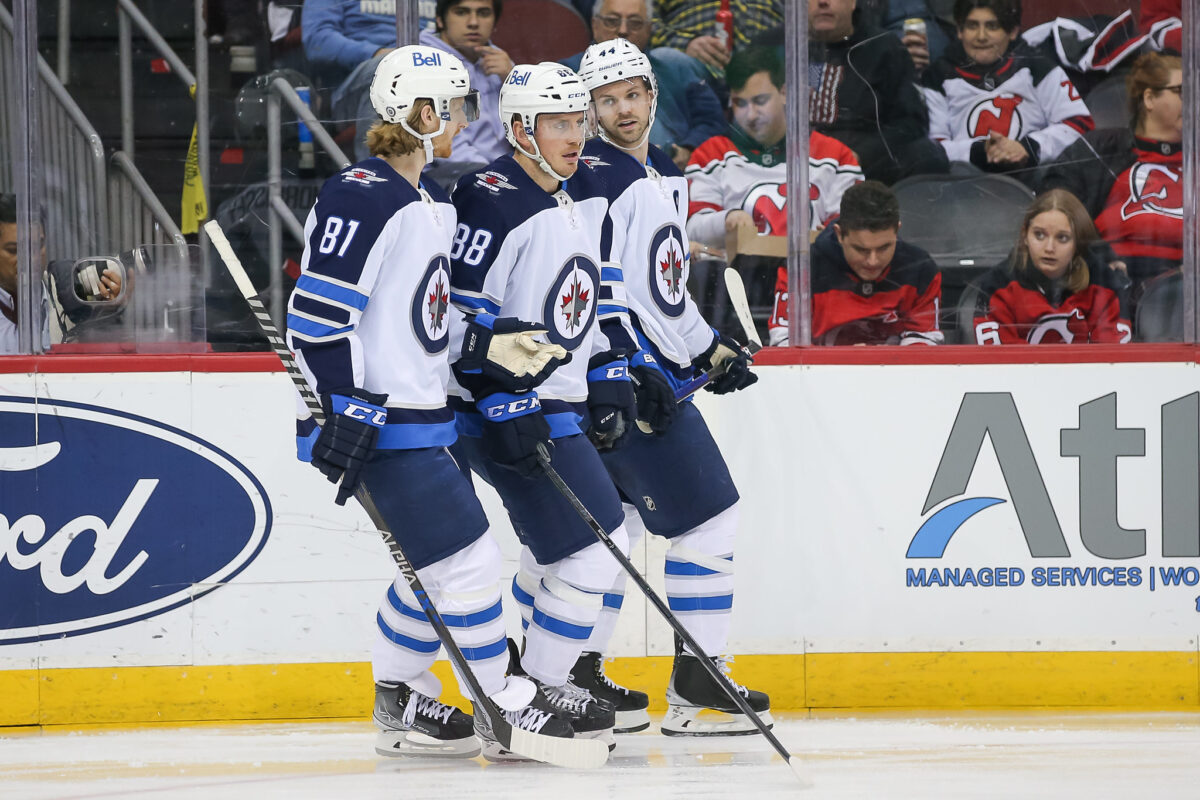The Winnipeg Jets have been consistent playoff contenders bolstered by a talented roster in recent years. Nevertheless, every successful team must make tough decisions to ensure long-term success. Nate Schmidt‘s overall performance and defensive shortcomings have occasionally overshadowed his offensive contributions, leading to concerns over his consistency and defensive reliability.
Considering the team’s aspirations for championship contention and the possibility of acquiring a more robust, well-rounded defenceman, exploring a trade involving Schmidt becomes a compelling course of action. In this piece, we look at why the Jets should consider trading him due to his underwhelming performance and its impact on the team’s potential.
Defensive Struggles
One of the most apparent reasons for trading Schmidt is his subpar defensive abilities. Throughout his tenure with the Jets, he has consistently struggled to excel in crucial defensive aspects, such as maintaining positioning, utilizing physicality effectively, and winning important battles in the defensive zone. These deficiencies expose his teammates to increased pressure, often resulting in opposing teams capitalizing on goals. Let’s break down three of his most obvious defensive struggles.
Related: 6 Jets Who Could Be Traded This Offseason
Schmidt has recently started to struggle with positioning and awareness. He’s caught out of position, which leaves his teammates open to the opponents’ offensive onslaughts. Any successful defenceman must consistently read the game, anticipate plays, and maintain proper positioning to neutralize threats effectively. His failures in these areas contribute to defensive breakdowns and opponents exploiting gaps in the Jets’ defence.
Something that isn’t considered enough is Schmidt’s struggle to maintain effective gap control. This is a fundamental aspect of any defenceman’s game. His frequent struggles with this crucial skill allow opponents to gain speed and create scoring opportunities. Additionally, he displays inconsistency in managing the defensive zone, often failing to clear loose pucks or sufficiently engage opponents along the boards, resulting in prolonged offensive possessions for the opposing team.

Today’s NHL game is fast-paced, and a defenceman’s transitional play from offence to defence is crucial for success. Schmidt often appears slow in transition, which allows opponents to exploit gaps and create odd-man rushes. His inability to recover quickly and close the gap on opposing forwards significantly limits his ability to disrupt offensive plays before they fully develop. These defensive shortcomings contribute to increased scoring chances for opposing teams.
Salary Cap Implications
The Jets face some salary cap constraints, making it crucial to use every last dollar wisely. Unfortunately, Schmidt’s contract, which has two years remaining at $5.95 million annually, commands a significant portion of the team’s cap space relative to his performance. By trading him, the Jets can free up valuable salary cap space, allowing for additional roster improvements or acquiring a player who offers better value for the money.
Trading Schmidt will have ramifications beyond immediate cap savings. The Jets front office must consider the long-term implications of this move. If the team anticipates future contracts for young core players or plans to engage in significant roster changes, the cap savings from dealing him could be invaluable in navigating these future financial hurdles.
The freed-up cap space from Schmidt’s departure could be utilized in several ways. The Jets might use it to re-sign key restricted free agents like Cole Perfetti, pursue free agents, or potentially acquire contracts in a separate trade. This financial flexibility can be instrumental in addressing other roster needs and enhancing the team’s overall competitiveness. Balancing the short-term financial considerations with the long-term strategic vision becomes crucial in ensuring the Jets’ sustained success. The team’s management faces a delicate balancing act, striving to optimize the roster while managing the salary cap effectively.
Impeding Defensive Depth & Chemistry
Schmidt’s presence on the roster also hinders the development and integration of younger defencemen within the organization. In any potential trade, the Jets would create an opportunity for these prospects to gain valuable ice time and experience at the NHL level, accelerating their development. With a more robust defensive lineup, the Jets can cultivate a stronger core capable of performing at a higher level in the long run.

The Jets have experienced defensive depth issues, which could hinder their ability to compete at a high level in the long run. Injuries or extended absences from key defencemen could expose the team’s lack of viable replacements and challenge their ability to sustain a solid defensive presence throughout the season. Trading an established player like Schmidt allows the team to give a younger player like Ville Heinola or Declan Chisholm a chance to shine.
For a team to be successful, the players must have good chemistry together. This sense of synergy allows the team to operate smoothly and efficiently, with each player understanding and complementing the strengths and weaknesses of their teammates. However, Schmidt’s lackluster performance as a defenceman can harm the overall chemistry of the defensive unit. This can lower the team’s morale and hinder their ability to work cohesively on the ice.
It would benefit the Jets to consider trading Schmidt for a more effective defenceman to address defensive depth. By making this strategic move, the team can strengthen its defensive line and create a more balanced and cohesive unit. The presence of a skilled and reliable defenceman will not only enhance the team’s defensive capabilities but also improve the players’ overall dynamic. Ultimately, the Jets can ensure a more balanced team by addressing these concerns and making the necessary changes. This will contribute to a more coordinated and effective performance on the ice, enabling them to achieve greater success.
While the Jets have undoubtedly benefited from Schmidt’s contributions at times, assessing his overall impact on the team is essential. His inconsistent defensive play, salary cap implications, and potential chemistry issues should prompt the Jets organization to explore trade options. By addressing these concerns and replacing him with a more impactful player, the Jets can strengthen their defensive corps, enhance overall team performance, and position themselves for long-term success.
Related: Winnipeg Jets 3 Worst Contracts for 2023-24
Trading Schmidt presents a chance for younger players to receive playing time. By leveraging whatever trade value he has, the Jets can secure additional assets that enhance the defensive depth while providing financial flexibility for the team. The Jets’ management must consider the long-term benefits and seize the opportunity to bolster their defensive depth, ultimately solidifying their position as serious contenders in the NHL.
